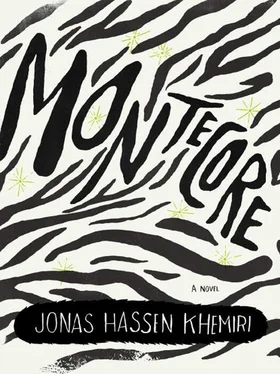Still, Tabarka’s daily life was night and day in Jendouba’s comparison. Instead of cookie packeting, our first summer in youthful freedom was a rosy time of beach parties, hashish, disco dancing, and repeated nightly visits in unfamiliar hotel rooms. Mark my words — the touristettes hung about like grape bunches with longing for our one-eyes.
Here you can inject an erotic scene where your father and I limbo oiled Belgian girls, disco-dance horny Brits, afflict French girls’ backsides, and encounter German twins in hot tubs. You can expose well-filled Portuguese girls on their knees on hotelesque balconies, perfumy mouths wide open, sucking the friends’ ecstasy while the duo toasts coconut drinks.
Does this erotic diversity sound bizarre? Perhaps you interpellate how we could attract the touristettes’ interest? Let me explain — this epoch was widely differentiated from now. At this time “Arab” was not a denotation that was used as provocation or virus. Rather the opposite. At this time, Arabicness attracted sexual frequency! The nationality of Arab was at least as positive as … a crank organ. (Do you understand the metaphor?) Frequent were the touristettes who invited me to their nightly hotel rooms after I had praised their golden skins. Numberous were the touristettes who sighed erotic moans when your father wrote their first names with Arabic letters in the beach sand or hailed them with made-up Arabic poetry translated into French. (He usually employed Arabic nonsense phrases like “gravel is good” or “take your towel” or “your nose is very ugly” and then with a serious mouth transformed the words to amorous French translations.)
Still, our courting routines were rather separated. Where your father did his “quiet wounded striving poet who glances his sad eyes to the starry sky” with habit, I did my “enthusiastic compliment-sharing dishwasher with a great interest in poker and a wide portion of humor.”
The youthful intoxication of luxury lent its character to this fantastic time. When I remember all the erotic nights now, all the shadows of limbs, all the melting moans, and all the head-banging remorse-awakings in strange hotel rooms, I am filled with that particular joy that we can call nostalgia (or sorrow).
In the fall came the day when your father’s collected economy bought its first functioning camera: a shining black Kodak Instamatic with the form compact, the material metal, and the loading system extra-modern. How much technical information does our book require? Do you think the reader is interested in photographic data like shutter speed and aperture and genre of lens? Perhaps we should just write:
“My father invested a camera and initiated documentation of the Tabarka of the past. The picture rather than the technique was his focus. He was in the habit of formulating himself poetically like this: What is the picture other than the bath plug of truth in the sandy sieving that we call the hourglass of life?”
Or we can write:
“My father’s camera bore, of course, the deluxe brand that still today is associated with the grandiosest quality: [X].”
(Here you can inject the name of the camera producter who will furnish you the biggest economic advancement.)
Suddenly your father bore the camera in his constant nearness. He began to form his fingers to the negative of fantasy, made thumbs and index fingers into a box, pretend-flashed scenes, and mumbled, “Parfait, parfait,” to himself. He began to present himself as “photographe artistique” and invested a beret in French black style. In the small hours of intoxication he testified with a front of suffering about how the craft of photography had modified his soul:
“I mean … the reality of life is, like, too … I mean since I discovered photography much more has … how should I put it … life has, like, a new shine … I mean … (hic) every sight gets like a
a
a
(hic)
sort of dimension of eternity … you know, Kadir? Hey … are you listening, or are you letting yourself be hypnotized by that Dutch cow’s breasts?” (I must confess — the breasts had me hypnotized.)
I remember that your father returned to this subject in 2001 in an e-mail he wrote me from a Palestinian family in the Ramallah of occupation. He wrote: “Oh, Kadir. What modifies life more than the magical insight about the potential freezing of everything?” This is a very beautiful phrase, which should be injected later in the book. (But exclude your father’s continuation: “Wait, there is one thing … fifty-three years of permanent oppression by a bloodthirsty occupying power! Fuck the potential freezing of everything!”) Do you understand your father’s words, or are they on the side of fuzziness? Perhaps this emotion refers to your discovery of writing? If so, inject a section where you write, “As usual, the genial Kadir is entirely correct …”
And Kadir actually has apoint, and when you read his letters you remember that day when you had just learned to read, and it has to be the year before Kadir comes to visit. You take the commuter train south with Dads to help with cleaning the stockroom in Grandpa’s sign store. The stairs up from the platform, pass the place where the shopping center is being built, cross the ghostlike empty square, and open the door to the sign store, where Grandpa is sitting hidden behind the gigantic huge cash register with stand-up buttons and listening to P1. You greet Grandpa and Grandpa clears his throat back and scratches his stump arm and you go right into the stockroom, where you pick up rags and start to polish the old metal signs with a special liquid that stings your nose. You wander around in Grandpa’s crammed stockroom, where one corner is taken up by old yellowed refrigerators with round corners and bags filled with bottle caps from the time of Gustav Vasa. You finger a few signs and pretend to polish but you’re really mostly just imitating Dads’s motions. And then suddenly your eyes land on a sign and you finally understand that Grandpa’s collection isn’t just a weird old man hobby but an ultimate time-travel portal for messages from the past. Because not just one but every single one of the old signs are full of letters that look just like the ones you practiced before school started. Slowly you start to spell your way forward. Th-th-thaa- maaa- … weeen … k-ke-ee-pth your body lean! Thun-light Thoap, Thtomatol, Philipth wadio, known fow ith good thound. At first you do it mostly to show off, to show Dads that you’re really quite a pro at reading. But Dads don’t seem to care, no matter how loudly you read. Dwink Champith. Fithkeby papew thold hew. Mathetti’th Ögon Cacao, deliciouth, thtwong, healthy. The only thing that’s hard is the s and r sounds. But you continue because the signs are chock-full of secret messages, codes that only you understand about mysterious historical things like Okthan Wood or natuwally alkaline Wamlötha minewal watew. And your strongest memory is the sign with the pipe-smoking man who’s standing in a brown floppy hat in front of a watery horizon, and you have always thought of him a little like an old ancestor because his skin is brown like yours and his crossed hands are almost hairier than Dads’. But now, on this day, you realize that he is actually an ad man for something called Tiedemann’th Tobacco and you’re just about to brag to Dads about your unparalleled reading abilities when Grandpa’s voice roars from the register: Tiedemann’s, for God’s sake. “S!” Not Tiedemann’th! When are you going to learn to talk properly? And Dads asks: What did he say? And you say: That I have a great talent for reading. And Grandpa yells: What did he say? And you say: That your sign collection is very impressive.
Читать дальше










